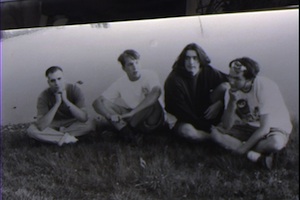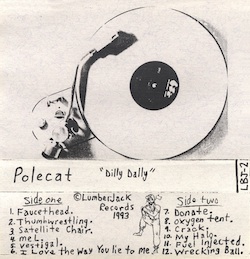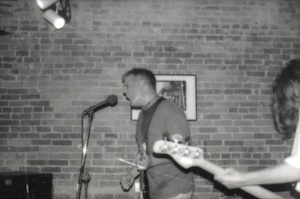Lazy-i Interview: The rise and fall and return of Slowdown Virginia and Polecat…

Slowdown Virginia circa 2010, from left, are Matt Maginn, Tim Kasher, Stephen Pedersen and Casey Caniglia. Photo by Bryce Bridges.
Slowdown Virginia b/w Polecat
Two legendary Nebraska bands reunite for one night only.
by Tim McMahan, Lazy-i.com
When Jason Kulbel and Robb Nansel opened Slowdown in the summer of 2007, it was inevitable that there would be a Slowdown Virginia reunion on the stage of the club named after the legendary band. But when that reunion would happen would come down to timing.
“We had the idea in our heads around the time Slowdown opened, but the schedules didn’t work out,” said Slowdown Virginia bass player and sometimes vocalist Matt Maginn from the dining room of guitarist Stephen Pedersen’s stylish midtown home. Sitting across from Pedersen and Maginn was drummer Casey Caniglia. The only one missing from this evening’s Slowdown Virginia reunion was frontman Tim Kasher, who was somewhere on the road touring in support of his debut solo album. And his absence was indeed, a problem.
“So we talked about a reunion off and on and then time and space aligned,” Maginn continued. “Tim (Kasher) moved back to Omaha in July. Cursive is in a writing phase and not touring, and it was the first time we saw an open window, which has now closed. We’d already confirmed the show by the time Tim’s solo tour was booked.”
“We’ll be fine,” Caniglia said.
“We decided a couple practices ago that we didn’t need Tim,” Pedersen quipped. “We’ll call people from the audience, and they’ll handle the singing.”
The funny thing is, there’s a good chance that the band could get away with that. A sizeable chunk of local talent — including most of the bands that would eventually make up the core of Saddle Creek Records’ all-star roster — likely will be in the audience Dec. 23 when Slowdown Virginia makes its celebrated return to the stage some 18 years after its debut.
Recalling the history of the band was a challenge, thanks in part to the passage of time and the glasses of dark red wine that Pedersen continued to pour throughout the evening. But Maginn was determined to get the record straight even when small arguments broke out over little details, like who Slowdown Virginia played with back in the day, circa 1994.
Maginn ticked off the names. “There was Mousetrap, Polecat, Frontier Trust, Mercy Rule…” What about 311? And Ritual Device? No one could quite remember.
“It gets confusing,” Maginn said. “We were friends with these bands and hung out with them at shows, but did we actually play with them? I’m not sure.”
It started sometime in 1992 when all four were at Creighton Prep. “We recorded our first five songs after the band was created out of another band, March Hares,” Maginn said. “We knew we needed something recorded to leave at shows.”
March Hares was a five-piece fronted by vocalist Jim Robino. After that band broke up and Robino moved on, Kasher slid into the frontman position and the new band became Slowdown Virginia, presumably a tribute to Kasher’s cat, Virginia, who was named after the song “Yes, Virginia,” by another local band, The Acorns.
Anyway… The band recorded those first five songs at Junior’s Motel, a ramshackle chicken coop converted into a recording studio in tiny Otho, Iowa, about 100 miles northwest of Des Moines run by Kirk Kaufman, former member of ’80s power-pop band The Hawks.
“We mixed the tracks at Digisound, which was overpriced,” Maginn said. “So we made the cheapest cassette covers we could using Stephen’s brother’s computer.”
Despite losing their asses financially on the cassette tape, the band kept trudging out to Otho to record, taking full advantage of its low-budget rates and Kaufman’s habit of letting them take over the studio after 9 p.m. “We continued to write and always had stuff to record,” Maginn said. “We’d record six or 10 songs and come home and mix them ourselves.”
By 1994, the band began working with a couple of producers — Melvin James, who was a friend of Kaufman’s, and Shimmy Disc founder Kramer, who mixed some of the tracks that eventually became Dead Space — the band’s full-length debut and the first CD ever released on Lumberjack Records — the label that would eventually be renamed Saddle Creek Records.
“It was Ted Stevens’ idea to put out the CD,” Maginn said. “He had heard every track we ever recorded at Otho. He talked me into it while we were driving around in his Cutlass, this long, red two-door that looked like a Monopoly car.”
“It was actually a Monte Carlo,” Stevens said a few days later. “I remember we all thought they were being courted by this label, and they were — by a couple labels, actually. Word on the street was they were saving these recordings for a record deal, but we had a feeling that the manager they were working with didn’t like the songs and wouldn’t put it out. We reached a point where even Conor (Oberst) had put out a tape, and Slowdown still hadn’t done anything in years.”
Listening to the tracks today, it’s easy to understand why Stevens was so eager to see Dead Space released. There’s something young and exciting and brazenly unchartered about the album, from the opening salvo “Supernova ’75” where Kasher spits out the lines “It’s automatic / It’s systematic / It’s hydromatic / It’s kind of tragic,” to the banging pop of “Whipping Stick,” where he screws his voice into a bizarre adolescent yowl, howling “Yeah, yeah I know you’re sick of me by now / Well thanks a lot for hanging ’round.” Throughout the disc, the music is equal parts chiming guitars and pulsing bass and drums, always taking an unexpected turn into some strangely different rhythm or tone. It was punk, it was post-hardcore, and yeah, it was emo, but it was the good kind of emo, the Rites of Spring/Minor Threat kind of emo.
And maybe when Stevens listened to those Slowdown Virginia tracks he could hear echoes of the future. The guitar and vocals at the beginning of the anthemic “Blame” and the laid-back “Another Sip” clearly hint at things to come in just a few short years.
Maginn said Stevens along with Conor and Justin Oberst, helped raise the cash needed to press 500 CDs at a cost of around $1,500 — considerably more than what it costs to produce a cassette tape — but worth it for this new technology. “Back then the conversation wasn’t ‘How many CDs did you sell?’ it was ‘We’re putting out a CD,'” Pedersen said. “That alone was the accomplishment. We had no idea what we were going to do with 500 of them.”
“We didn’t sell them all,” Maginn said. “I remember helping with inventory control in the Oberst attic. But we eventually sold enough to pay back the investors.”
If sales were slow it might be because the band rarely played outside of Omaha or Lincoln. The one road trip they remembered was a gig at a biker bar called Joe’s Pub in Council Bluffs. “The promoters gave us money to leave early because the crowd was going to kill us,” Maginn said.
Little did they know how big of an influence Slowdown Virginia would have on the future of the Omaha music scene. “Well, I’d say they had a pretty major impact,” Stevens said. “It’s hard to get a perspective of what their sound was at the time. It seemed so unique, but it was a pretty major influence. A big group of us would listen to Slowdown and get kind of weird. Looking back, we were geeks about it.
“Toward the end, after we met Todd and Clark Baechle (who would go on to form The Faint) and a lot of the Westside crowd, people started coming out to their shows,” Stevens added. “I never had the feeling they were very popular, but they had a die-hard set of followers.”
It was all over by the spring of ’95. Despite recording enough material for another CD, Slowdown Virginia played its final show at the Cultural Center in Lincoln that April. Maginn said the breakup was inevitable. “Tim was leaving town, he was going to go to school at the University of Kansas.”
Caniglia also had had enough. “I was 21 and out,” he said. “I could take it or leave it.”
But there was no stopping the rest of them. A month later, Pedersen’s other band, Smashmouth, which included drummer Clint Schnase, would combine with Slowdown Virginia. The merger resulted in a little band by the name of Cursive.
Skinning a Polecat
While all of that was happening, Ted Stevens was involved in a band of his own. Stevens formed Polecat after his high school band, Gravy Train (which also included Pedersen and Schnase), broke up when he left for college at University of Nebraska-Lincoln.
“I wound up at Abel Hall in a dorm with a bunch of people from Omaha,” Stevens said. “I was introduced to Boz Hicks, who lived a floor below us.” Hicks and Stevens were both fans of free-wheeling tractor-punk band Frontier Trust. “I think it was Gary Dean Davis from Frontier Trust that tipped me off to Oli Blaha.”
Blaha was the drummer in Lincoln band Hour Slave that, like Gravy Train, broke up when its members graduated from high school. “I remember seeing them play at Duffy’s and thinking they were pretty cool,” Stevens said, “so I cold called him.”
With Hicks on drums, Blaha on bass and Stevens on guitar and vocals, Polecat headed to the North Platte basement studio of Mike and AJ Mogis in November 1993, where they recorded the tracks for their first cassette, Dilly Dally, released on Lumberjack Records the following spring. It was followed by their first 7-inch — “Saddle Creek” b/w “Chinese Water Torture” — released jointly by Double Zero and -Ism Recordings.
Polecat’s sound was lean, mean Midwestern punk rock covered in a thin layer of prairie dust. Like its predecessor Frontier Trust, their music had a rural flair, but unlike Gary Dean Davis, Stevens could actually carry a tune, even when he was spitting out angst-ridden lines like, “It’s hard to repay all the tears that you give to me / To see the inside jokes turn outside in.” Driving their sound was the trio’s superb balance — no one member outshined the other. Polecat was a perfect corn-fed rock ‘n’ roll machine.
The band quietly built a following by performing constantly in Lincoln, Omaha and Western Nebraska. “Boz had bought this conversion van and we were young and having a good time,” Stevens said. “We traveled all through Nebraska — Kearney, Hastings, North Platte.”
Unlike Slowdown Virginia, Polecat even played out-of-state gigs. “I started a relationship over the phone with Dave Dondero and Russ Hallauer of the band Sunbrain,” Stevens said. “We ended up driving down to Atlanta to play with them, followed by Charlotte, North Carolina.”
Polecat eventually cut a split 7-inch with Sunbrain that was jointly released by Lumberjack and Hallauer’s Ghostmeat imprint. Ghostmeat would go on to include Polecat on a number of the label’s compilation CDs.
By 1995, Polecat was entering the studio with AJ Mogis again to record an 11-song follow-up to Dilly Dally slated for release as a CD by Lumberjack. But the album never saw the light of day.
“I sure got a lot of grief about it,” Stevens said of the breakup. “We weren’t getting along in the studio very well. I was a little hard headed, and it’s my fault the record never came out. It never sounded right to me. Now I think it’s the best stuff we ever recorded. I’ll take a lot of credit for the band breaking up.”
As luck would have it, the day after Polecat disbanded, indie record label Bar None called Stevens about his other band, Lullaby for the Working Class.
“Mike (Mogis, a member of Lullaby) had been networking with manila envelopes and 8 x 10 promo photos of the band,” Stevens said. “I remember we were all in calculus class, and Boz was bummed out while AJ (who also was in Lullaby) was beaming because we were about to get signed. It looked bad.”
Lullaby for the Working Class would go on to garner international praise for its unique brand if indie chamber pop, culminating in a European tour — something unheard of for a local band at that time. But eventually Lullaby would break up, too.
By 2000, Stevens would wind up as a guitarist/vocalist in Cursive, joining Kasher, Maginn and Schnase. He replaced Pedersen, who quit Cursive when he enrolled in law school at Duke University. Pedersen would eventually form two more bands — The White Octave in 2000, and Criteria in 2003. He’s now an attorney at Omaha’s most prestigious law firm — Kutak Rock.
Despite the unfortunate timing of their breakup, it didn’t take long for Boz Hicks to forgive Stevens. In fact, Polecat had its first reunion show 10 years ago. “At the time, I knew we’d do it again,” Stevens said. “I don’t know why we’re doing it this year. It might have something to do with the Lullaby reunion (which took place this past summer) and how good that felt to be in that band again for the night.”
Stevens said he’s been spending a lot of time with Hicks, who works at Slowdown and plays drums in a number of local bands, including Her Flyaway Manner.
As for Oli Blaha: “When Oli left Lincoln, he really left,” Stevens said. “He went to Edinburgh and then Anchorage. He’s really a jet setter. Now he’s married and living in Oklahoma City where he goes to school.”
With Blaha returning to Nebraska to spend Christmas with his father, Stevens said everything fell into place for a Polecat reunion. And what better way to do it than with Slowdown Virginia at Slowdown?
“When Slowdown opened, I knew the reunion was inevitable and that I better start drumming again,” said Caniglia, who works with his father, Jerry, and his Uncle Chuck at Venice Inn. “Everyone I know has no idea that I was in this band.”
But can they pull it off with Kasher not coming back into town until Dec. 19?
“We’ll be ready,” Pedersen said. “I’m having a blast. It’s all brand new again, and part of that is because my memory is crap.”
“For us, the real fun has been being together again,” Maginn said. “I’m smiling the whole time I’m down in the basement.”
Slowdown Virginia plays with Polecat and DJMBowen Thursday, Dec. 23, at The Slowdown, 729 No. 14th St. Showtime is 9 p.m. Admission is $10. For more information, call 402.345.7569 or visit theslowdown.com.
Published in The Omaha Reader Dec. 22, 2010. Copyright © 2010 Tim McMahan. All rights reserved. Photo by Bryce Bridges, used with permission. Vintage photos of Slowdown Virginia and Polecat supplied by Rob Walters.
* * *
Read Tim McMahan’s blog daily at Lazy-i.com — an online music magazine that includes feature interviews, reviews and news. The focus is on the national indie music scene with a special emphasis on the best original bands in the Omaha area. Copyright © 2010 Tim McMahan. All rights reserved.
5 Comments
RSS feed for comments on this post.
Sorry, the comment form is closed at this time.





April 8, 1995: Slowdown Virginia opened for Memphis’ undeniable The Grifters , in a little joint in Lincoln that was called Cafe Shakes ( I think it was right by Duffy’s). Killer show….
Comment by dane — December 22, 2010 @ 2:20 pm
p.s. As noted in the piece above, Cursive formed in Spring of ’95. I was at a Cursive show 7/25/95, at the Cog, opening for Silkworm (!!!!). Anyone know if this was Cursive’s first show?
Comment by dane — December 22, 2010 @ 2:32 pm
Download the “lost” Polecat album here:
http://www.thebandbrokeup.com
Comment by wolfie — December 23, 2010 @ 11:03 am
[…] folks at Saddle Creek Records are hinting that tonight’s Slowdown Virginia/Polecat reunion show at Slowdown is bound to sell out, so if you don’t have your tickets yet, you better get […]
Pingback by Lazy-i » Column 302: How Mousetrap’s Patrick Buchanan became ‘invincible;’ Slowdown Virginia/Polecat tonight… — December 23, 2010 @ 1:26 pm
[…] came on a little after 11 and played for an hour. This material has aged well indeed, and during our interview, there was a recounting of interest by a certain local record label to remaster and rerelease the […]
Pingback by Lazy-i » Live Review: Slowdown Virginia, Polecat… — December 24, 2010 @ 11:03 am